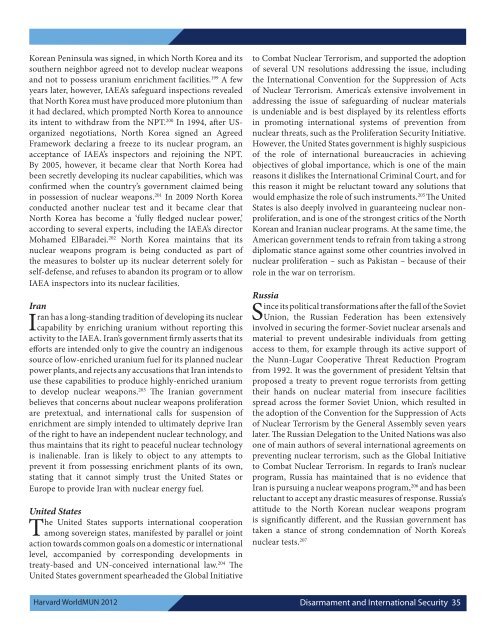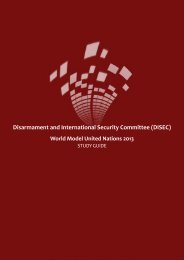Disarmament and International Security - World Model United Nations
Disarmament and International Security - World Model United Nations
Disarmament and International Security - World Model United Nations
Create successful ePaper yourself
Turn your PDF publications into a flip-book with our unique Google optimized e-Paper software.
Korean Peninsula was signed, in which North Korea <strong>and</strong> its<br />
southern neighbor agreed not to develop nuclear weapons<br />
<strong>and</strong> not to possess uranium enrichment facilities. 199 A few<br />
years later, however, IAEA’s safeguard inspections revealed<br />
that North Korea must have produced more plutonium than<br />
it had declared, which prompted North Korea to announce<br />
its intent to withdraw from the NPT. 200 In 1994, after USorganized<br />
negotiations, North Korea signed an Agreed<br />
Framework declaring a freeze to its nuclear program, an<br />
acceptance of IAEA’s inspectors <strong>and</strong> rejoining the NPT.<br />
By 2005, however, it became clear that North Korea had<br />
been secretly developing its nuclear capabilities, which was<br />
confirmed when the country’s government claimed being<br />
in possession of nuclear weapons. 201 In 2009 North Korea<br />
conducted another nuclear test <strong>and</strong> it became clear that<br />
North Korea has become a ‘fully fledged nuclear power,’<br />
according to several experts, including the IAEA’s director<br />
Mohamed ElBaradei. 202 North Korea maintains that its<br />
nuclear weapons program is being conducted as part of<br />
the measures to bolster up its nuclear deterrent solely for<br />
self-defense, <strong>and</strong> refuses to ab<strong>and</strong>on its program or to allow<br />
IAEA inspectors into its nuclear facilities.<br />
Iran<br />
Iran has a long-st<strong>and</strong>ing tradition of developing its nuclear<br />
capability by enriching uranium without reporting this<br />
activity to the IAEA. Iran’s government firmly asserts that its<br />
efforts are intended only to give the country an indigenous<br />
source of low-enriched uranium fuel for its planned nuclear<br />
power plants, <strong>and</strong> rejects any accusations that Iran intends to<br />
use these capabilities to produce highly-enriched uranium<br />
to develop nuclear weapons. 203 The Iranian government<br />
believes that concerns about nuclear weapons proliferation<br />
are pretextual, <strong>and</strong> international calls for suspension of<br />
enrichment are simply intended to ultimately deprive Iran<br />
of the right to have an independent nuclear technology, <strong>and</strong><br />
thus maintains that its right to peaceful nuclear technology<br />
is inalienable. Iran is likely to object to any attempts to<br />
prevent it from possessing enrichment plants of its own,<br />
stating that it cannot simply trust the <strong>United</strong> States or<br />
Europe to provide Iran with nuclear energy fuel.<br />
<strong>United</strong> States<br />
The <strong>United</strong> States supports international cooperation<br />
among sovereign states, manifested by parallel or joint<br />
action towards common goals on a domestic or international<br />
level, accompanied by corresponding developments in<br />
treaty-based <strong>and</strong> UN-conceived international law. 204 The<br />
<strong>United</strong> States government spearheaded the Global Initiative<br />
to Combat Nuclear Terrorism, <strong>and</strong> supported the adoption<br />
of several UN resolutions addressing the issue, including<br />
the <strong>International</strong> Convention for the Suppression of Acts<br />
of Nuclear Terrorism. America’s extensive involvement in<br />
addressing the issue of safeguarding of nuclear materials<br />
is undeniable <strong>and</strong> is best displayed by its relentless efforts<br />
in promoting international systems of prevention from<br />
nuclear threats, such as the Proliferation <strong>Security</strong> Initiative.<br />
However, the <strong>United</strong> States government is highly suspicious<br />
of the role of international bureaucracies in achieving<br />
objectives of global importance, which is one of the main<br />
reasons it dislikes the <strong>International</strong> Criminal Court, <strong>and</strong> for<br />
this reason it might be reluctant toward any solutions that<br />
would emphasize the role of such instruments. 205 The <strong>United</strong><br />
States is also deeply involved in guaranteeing nuclear nonproliferation,<br />
<strong>and</strong> is one of the strongest critics of the North<br />
Korean <strong>and</strong> Iranian nuclear programs. At the same time, the<br />
American government tends to refrain from taking a strong<br />
diplomatic stance against some other countries involved in<br />
nuclear proliferation – such as Pakistan – because of their<br />
role in the war on terrorism.<br />
Russia<br />
Since its political transformations after the fall of the Soviet<br />
Union, the Russian Federation has been extensively<br />
involved in securing the former-Soviet nuclear arsenals <strong>and</strong><br />
material to prevent undesirable individuals from getting<br />
access to them, for example through its active support of<br />
the Nunn-Lugar Cooperative Threat Reduction Program<br />
from 1992. It was the government of president Yeltsin that<br />
proposed a treaty to prevent rogue terrorists from getting<br />
their h<strong>and</strong>s on nuclear material from insecure facilities<br />
spread across the former Soviet Union, which resulted in<br />
the adoption of the Convention for the Suppression of Acts<br />
of Nuclear Terrorism by the General Assembly seven years<br />
later. The Russian Delegation to the <strong>United</strong> <strong>Nations</strong> was also<br />
one of main authors of several international agreements on<br />
preventing nuclear terrorism, such as the Global Initiative<br />
to Combat Nuclear Terrorism. In regards to Iran’s nuclear<br />
program, Russia has maintained that is no evidence that<br />
Iran is pursuing a nuclear weapons program, 206 <strong>and</strong> has been<br />
reluctant to accept any drastic measures of response. Russia’s<br />
attitude to the North Korean nuclear weapons program<br />
is significantly different, <strong>and</strong> the Russian government has<br />
taken a stance of strong condemnation of North Korea’s<br />
nuclear tests. 207<br />
Harvard <strong>World</strong>MUN 2012 <strong>Disarmament</strong> <strong>and</strong> <strong>International</strong> <strong>Security</strong> 35 35

















